Student Blog
Beginnings and Endings
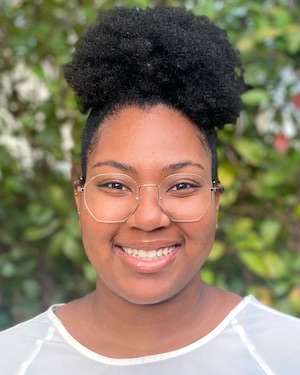
6 Lessons from My First Semester as an OTD Resident ⟩
December 23, 2021, by Kayla
Beginnings and Endings Life Hacks What are OS/OT?
The first semester of my OTD year has come to an end, here are some lessons that it taught me. Let’s get right into it!
1. This is Not The Master’s Program Anymore
As a student in the MA-II program, I became so accustomed to (and honestly, reliant on) the structure; class four days a week and one day for fieldwork. It was so consistent that when I began the OTD and my schedule became so much more flexible it was a bit of a shock. In the OTD program, you have class 1 day a week and all other time is spent engaged at your residency site. Because I spent the majority of my time providing direct patient care, I found myself having to switch my brain from “clinical to classroom” in order to be in the right headspace for group discussions and class participation. I really had to adjust to the new flow of things . . . adapt to my new roles and routines, if you will.
2. You Won’t Feel Overwhelmed Forever
Beginning a new program, moving halfway across the country, figuring out my role as the first resident at my site, studying for boards, and tending to my mental and physical health . . . it was a lot. I remember attending a residency seminar entitled, “What Have I Gotten Myself Into”, where residents currently in their final semester of the program reflected on their first semester and assured us that even though it was going to get hectic, that we would make it through. On the other side of my first semester, about three things I am absolutely sure. First, I was 100% overwhelmed during the first few months of the semester. Second, I was not alone in feeling this way. Third, that feeling does not last forever.
For me, what helped get through the days where it felt like I had too much on my plate was to remember my why. Thinking about why I began on this journey in the first place, understanding how my current responsibilities fit into the bigger picture, and most importantly, taking a deep breath and giving my best effort.
3. Mistakes Are Going to Happen
I am no stranger to making mistakes, but over the course of this semester as I was beginning to come into my role as a new professional I, expectedly, made more than I was used to. I had to learn how to reframe my mistakes in a way that allows for growth rather than feelings of guilt and how to turn thoughts of “Why did I do that?” into, “How can I do better?” Mistakes are a part of the process of learning and I had to learn to be thankful for the new perspective I gained along the way, after all . . . perspective is everything!
4. How To Navigate The “In Between”
As an OTD resident although you are a registered and licensed therapist, you still occupy the role of a student and mentee. This semester taught me how to embrace the duality of the unique position that we as residents are in. I was faced with having to define my role as an OTD resident, especially because my site has never had one before, and learn to be confident and accepting of changes as I encountered them. Biggest takeaway: be confident in the path you’re walking and don’t be afraid to ask for help when you’re unsure of your next step!
5. No Two Residencies Are The Same
This lesson is rather short, sweet, and to the point. Even if you share the same area of practice with another resident, no two placements are alike. Things between residencies may be different, but yours is specific to you and your interests and THAT is what matters. Remember: comparison is the thief of joy.
6. The OTD Really is What You Make It
If you have ever met with me either via office hours or one-on-one, I always harp on this sentiment. This program is what you make it, it is YOUR experience, YOUR vision, and YOUR year. For many of us, there will never be another time in our professional career when our only goal is to observe and to learn as much as we can. It is so easy to get caught up in all of the stress and responsibility (I am by no means exempt from this), that we forget to seek out and enjoy the experiences that come along with this program. This semester challenged me to not only be more mindful and present but to truly stick to the goals I set for myself to make sure that I am taking full advantage of the opportunity in front of me.
As this semester, and year, come to an end I can’t help but look forward to all of the experiences and new knowledge that 2022 holds. More importantly, I can’t wait to share them all with you. Happy Holidays!
⋯

So You Made The Decision . . . Now What? ⟩
September 30, 2021, by Kayla
Admissions Beginnings and Endings
Am I Really Doing This?
I’ve always found a reason to stay pretty close to home; for undergrad I only strayed about 45 minutes down the 210 (including the time added on by traffic) and then I thought I was really stepping out on my own when I moved to LA for grad school at USC. So with that background information, you can imagine the shock that my family and friends felt when I said the words, “I’m moving to Chicago.” I had a hard time wrapping my head around the reality of the decision I had just made as well. Truth be told, I was in denial for a while, but after the denial came acceptance . . . then came stress.
Feeling All The Feels
Stress. It doesn’t discriminate between positive and negative things, it just happens. So while I was excited that it was almost time to actually set off to Chicago, my mind was constantly racing thinking about all of the things that I still needed to plan/organize/do.
Anxiety. It can happen even if we can rationally think through our problems, sometimes that alone just isn’t enough. The OTD program follows a traditional schedule, beginning in late August; I was not set to start the clinical portion of the program until September 20th! And while I knew that the program is designed to be flexible to these very situations, I was worried that I was somehow falling behind. I had to remind myself that this is MY journey and that comparison is nothing but the thief of joy.
During this phase, I really had to believe that everything would come together, be confident that I was prepared to handle the changes coming my way, and more than anything remember the reasons why I decided to complete the OTD.
Strength in Goodbyes
As the time came closer for me to load up a moving truck and drive across the country, I started reflecting on all of the reasons WHY I stayed so close to home for so long. The two most prominent being my family (including my two nephews that I absolutely adore) and the remarkable group of people I get to call my friends. I made sure to be intentional about spending time with my loved ones (and eating as much delicious California food as possible) before I left. The love and support they poured into me made it so clear that no matter where I went, or how far I was, I would not be going through this year alone.
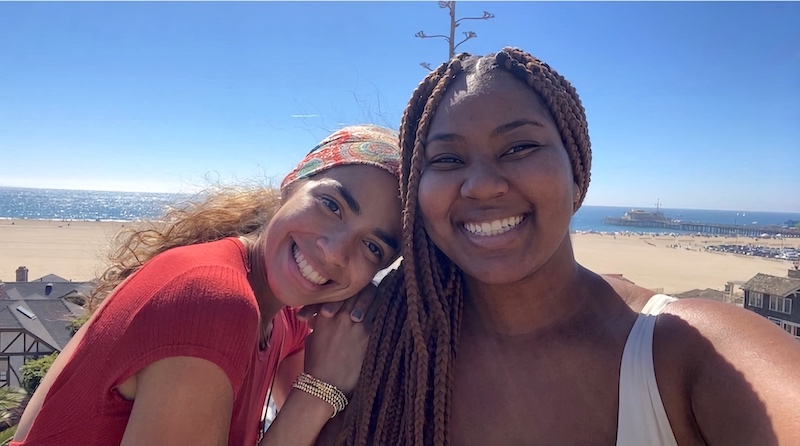
Lunch in Santa Monica with Guarina
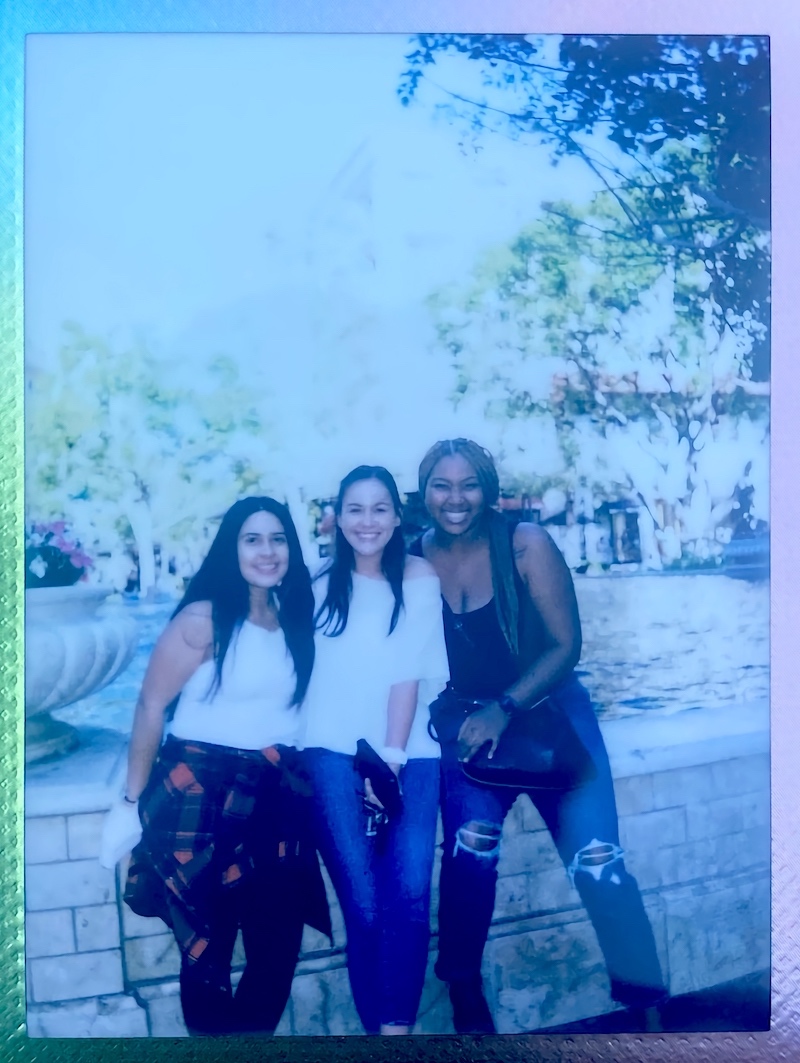
A polaroid with my classmates, Kim and Alex
No Turning Back
2,000 miles, 35 hours, 7 states, 3 days, and 2 AMAZING parents that dropped everything to traverse the country with me in a moving van. As we put more miles behind us and got closer to Illinois everything became real and (despite a quick moment of apprehension somewhere in the middle of Oklahoma) I finally felt ready.
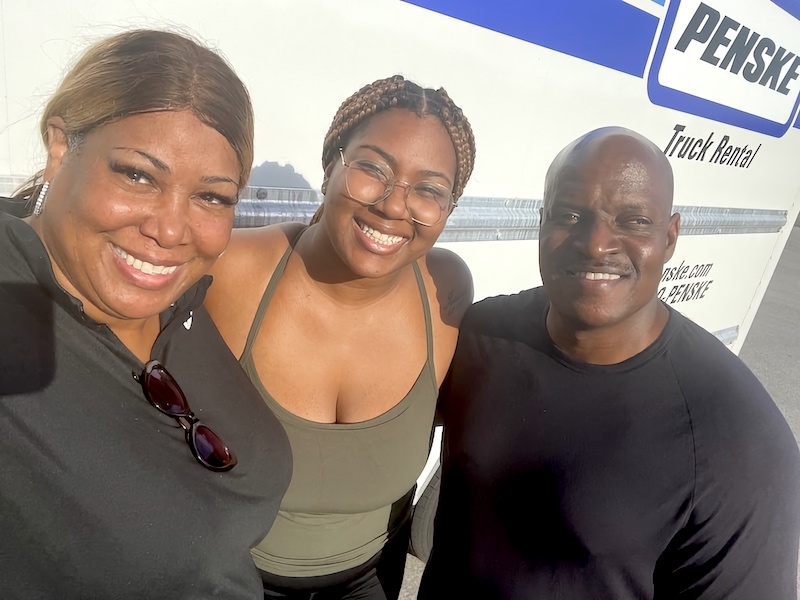
Last day of our road trip!
I wanted to share this with you all because I know that this is the time when you are making some pretty big decisions about your future and it can feel like there are so many unknowns ahead of you. If there is one thing that I have learned thus far in this experience is to not let that stop you from taking a chance on yourself. As deadlines are approaching keep that in mind, because you never know, it might be turn out to be everything you hoped for, good luck!
⋯
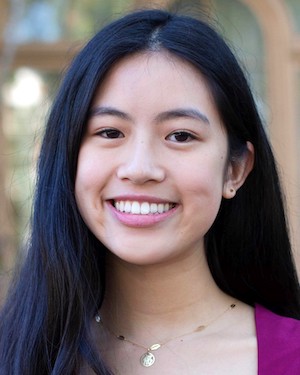
What I learned during my time as a student ambassador ⟩
August 9, 2021, by Arianna
Beginnings and Endings Getting Involved
When I first started this job, I wasn’t sure I’d be able to handle all of the responsibilities that came with it. During the school year, there are typically 7 student ambassadors working at the same time. However, in the summer there is only one. I felt apprehensive going into this job but after a few weeks of work, I was pleasantly surprised with how comfortable I was in this position. For my last blog as the summer student ambassador, I thought I’d let any prospective student ambassadors know how this job helped me with my personal growth and what the position entails!
Information Sessions
One of the first tasks I had was hosting an information session for the Entry-Level OTD program with Dr. Anvarizadeh. I ended up doing 6 info sessions throughout the summer! At these info sessions, I presented a few slides and answered questions in the chat. Speaking about a program that doesn’t exist was a little intimidating, but Dr. Anvarizadeh, Dr, Nxumalo, and Dr. Bennett set great examples and their positive feedback helped me overcome any lingering feelings of imposter syndrome!
These information sessions helped me develop my public speaking skills and after a few info sessions, I noticed that I sounded more natural. Being completely honest, I did have notes that I referred to as I spoke, but doing info sessions taught me how to sound like I wasn’t reading a script. Eventually, I was able to host a BS-OTD info session by myself and I didn’t have to use any notes! To be fair, the BS-OTD program is extremely similar to the BS-MA program so most of the information was easy for me to explain.
Social Media
If you weren’t aware, I have been managing the social media accounts for the past 13 weeks. I enjoyed this responsibility because it allowed me to express my creative side! I also want to say a quick thank you to all the students who sent me pictures to post on our accounts. From your arts and crafts to Neuro PJ Day, the photos you’ve shared added so much vibrancy to our accounts! Managing social media accounts involves deciding what to post and when, designing the graphics for each post, and reposting all the wonderful posts we’re tagged in!
Handling the social media accounts taught me how to analyze trends! I noticed that our most popular posts celebrate the joys and accomplishments of the USC Chan Family. I hope that we continue to share these events with you all and I’m sure there will be an abundance of occasions to post about in the upcoming school year!
Meeting with prospective students
Out of all the different responsibilities I had, this one was my favorite. Meeting with prospective students involves setting up a one-to-one Zoom meeting and answering any questions one may have.
This aspect of my job was my favorite because I got to be an advocate for our program and I was able to share my experiences with potential future Trojans. I think this was the one task that I didn’t learn a whole lot from, which is not a bad thing! The meetings I had with prospective students flowed so naturally. I didn’t get nervous when I talked to them, and there was never any awkward silence because I can talk about Chan for hours and hours!
Admissions Projects
Working on projects for the admissions team was probably the area I was most inexperienced in. These projects involved collecting and organizing data so that our admissions team could use it in the future.
The most obvious skill I gained from working on admissions projects was how to use spreadsheets. I had almost no experience with spreadsheets when I started my job as a student ambassador. However, after 13 weeks of admissions projects, I’ve learned many tricks that I hope to use in the future!
Blogging
Last but not least, blogging was part of my job as a summer student ambassador. The student ambassadors have full control over what they write about, which makes it more of a therapeutic activity instead of work. We can give advice to students, talk about our favorite occupations, and even document a vacation (which I did)!
Blogging taught me how to write in different styles. The first blog I wrote was written with a slightly formal tone. However, I quickly realized that blogs are supposed to be fun to read! The audience does not want to feel like they are reading out of a textbook. Therefore, I let down all my walls and started writing with a more personal voice. Doing this made the writing process so much easier. I just let the words flow straight from my mind to the computer without worrying about how professional I sounded.
Well I guess this is the end of my blogging series! I enjoyed testing out my writing skills over these past 13 weeks and I hope some of the advice I wrote was helpful to many! Thank you all for reading and if there are any prospective student ambassadors reading this, I hope you learned a little more about the position!
⋯

Not All Goodbyes Are Bitter ⟩
May 10, 2021, by Lamoni
Beginnings and Endings Diversity What are OS/OT?
I cannot believe graduation is this week! We often view goodbyes as a gloomy moment, but it does not have to be that way. Some goodbyes are actually good! For me, this goodbye means that it is time to close one chapter as I transition to another. But it does not necessarily mean that I am parting ways. Everything that I have gained will stay with me — the friends, memories, experiences, knowledge, professional relationships. I will cherish them no less than I do now.
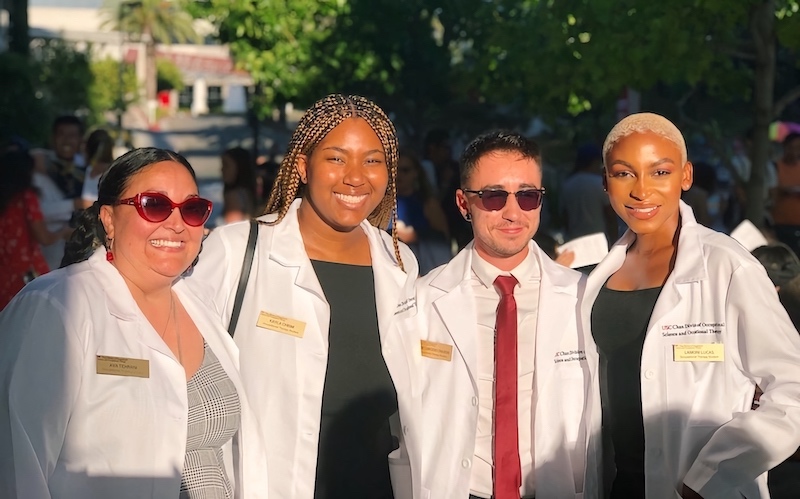
Faces of OT
Here was August of 2019 at our whitecoat ceremony. That was an extra special day because we defeated the treacherous (I mean, “intensive”) first summer! We were glowing because we finally got some rest. After putting on that whitecoat, my OT journey officially began. I stood next to some pretty Rockstar people too! Knowing that I would enter a career field with them was comforting. I have found that It is the people around you that truly make your experiences great.
To all of my friends (within the program and outside of it), thank you for being by my side, thank you for understanding when I missed your call, thank you for staying on the phone with me for 3+ hours when I returned your call, thank you for sending me housewarming gifts when I first moved to California, thank you for sending me words of encouragement while I studied for the GRE, thank you for studying at Norris Library with me and creating bizarre mnemonics, thank you for going to the flower district with me and helping me become a plant mother, thank you for game nights and movie nights. Thank you for being my friend.

My dad (aka my heart) and I
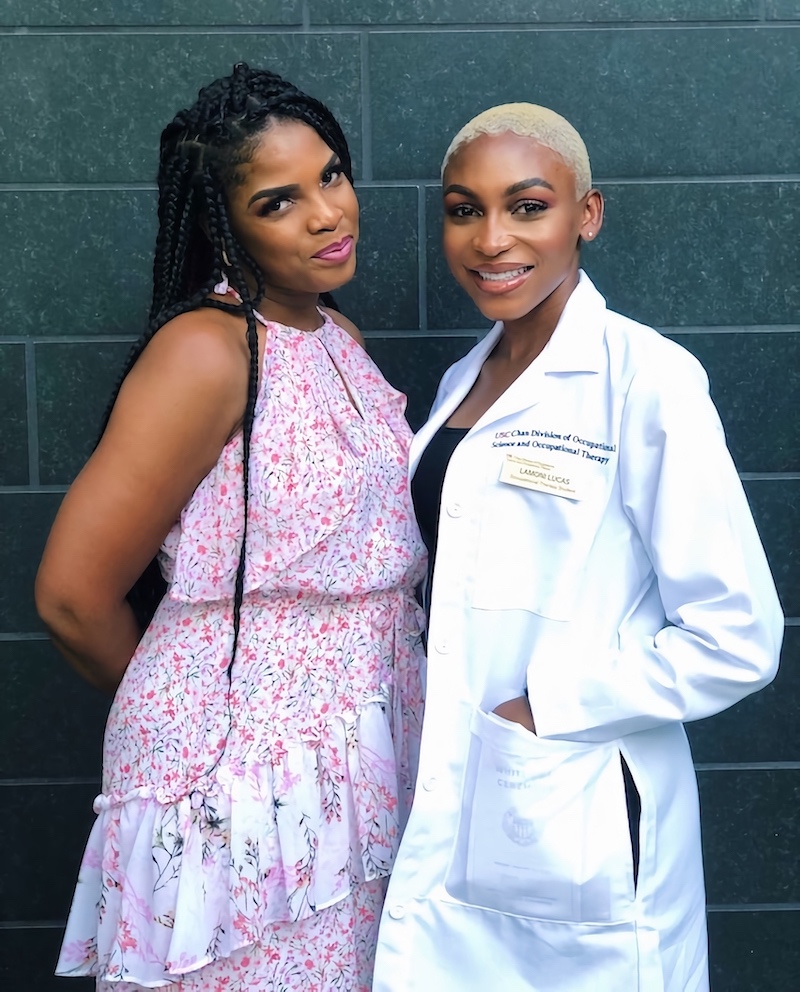
My mom (aka my soul) and I
Not to be dramatic with the picture captions but, my parents are my Day 1’s! My biggest supporters! My everything! Thank you to my mom and dad for all that you have done and continue to do. Though neither of you pursued college and thus, do not have first hand experience about the challenges, you have done everything in your power to support my higher education (even if that meant accepting that I would move 2k miles away TWICE). No matter how far, I have always felt your warmth. I am so incredibly thankful to have parents like you. Nothing I can say or do will accurately show how much I love you.
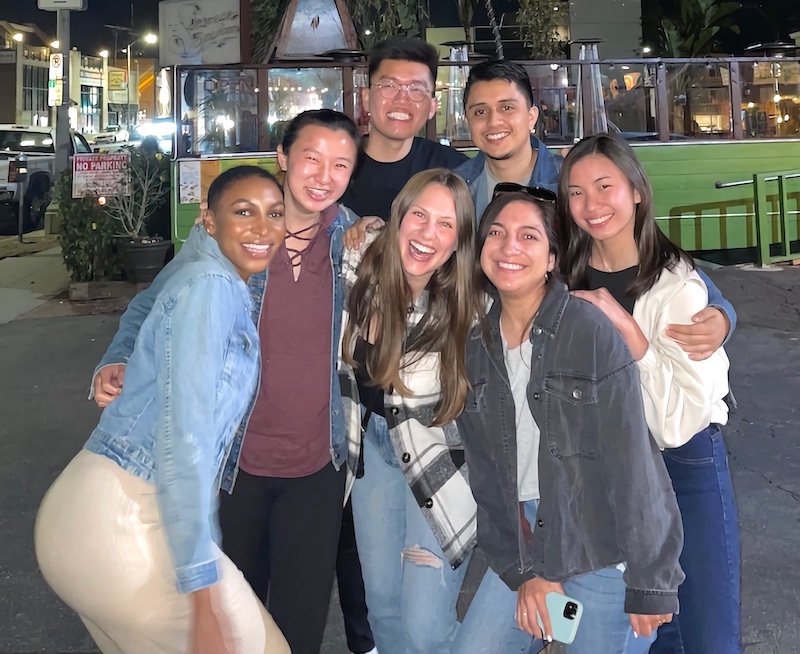
Your favorite squad
To my team: We did not know exactly what we were signing up for. Chan has never had a set of ambassadors through a COVID pandemic. But, we did that! Along with LOTS of help from Kim Kho (the most caring supervisor ever), we figured it out. Thank you all for being so helpful, collaborative, and fun! It has been a pleasure to work with you, share a group chat with you, and share a meal with you. This experience would not be the same without you.
I will admit, my eyes watered a bit while reflecting and writing out my thank you’s. But, it was happy tears! I just feel so incredibly grateful to have such amazing people in my life. My experience as a USC Chan Master’s student was phenomenal because of YOU! Thank you to everyone that has read my blogs, left comments, and written emails. It has been so special to connect with you all in this way. Keep on fighting on!
With all my love,
Lamoni
⋯
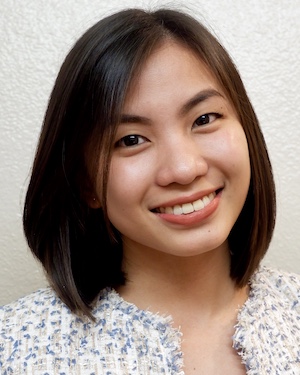
I Don’t Say This Every Day But . . . ⟩
May 7, 2021, by Yna
Beginnings and Endings Classes Diversity International
We spent how many hours on Zoom every day for 9 months, yet it wasn’t until the last day of classes when I realized just how much I’m going to miss my MA1 classmates. What we thought was only going to be a temporary virtual learning setup has been stretched to a whole academic year. Even though this was surely nothing close to how we imagined going through graduate school, still, for some reason, it went our way because we are finishing in A WEEK! It just weirdly feels a little short. I’m still at a loss for words, just like how I was when I was trying to write my very first blog. What words could possibly capture how great of an adventure it has been?
A couple of months ago we were all just a bunch of strangers trying to find a place in this new world. It’s one thing to find acceptance; but feeling a sense of belongingness and a feeling of home is a whole different story — one that I’ve found in this wonderful group of people. I have hoped for companionship but what I’ve found is so much more: teamwork, diversity, and nothing but love and support for one another. I’m really so proud of us and all I can think of is — what a time to be in to witness these individuals succeed through challenges! We really embodied that “Fight On!” Trojan spirit, didn’t we? Truly, my experience thus far has been nothing short of amazing because of all the people on the other end of my computer screen. I’m sure you know, but it bears repeating.
Here are some of the unforgettable memories we had in the past year 😊
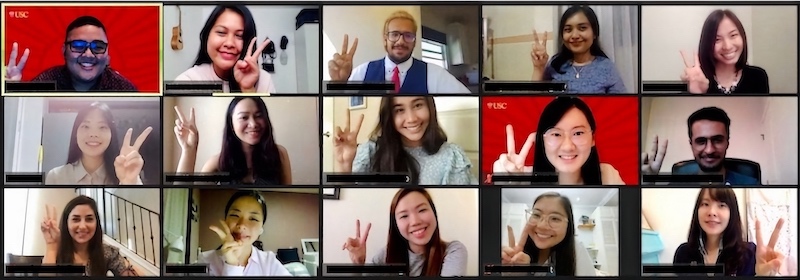
MA1 Virtual White Coat Ceremony
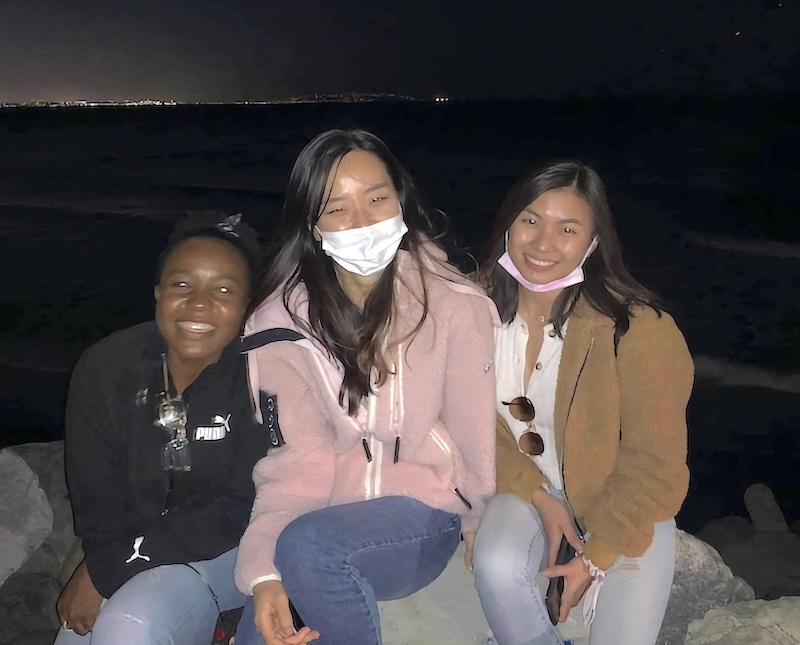
MA1s at the beach
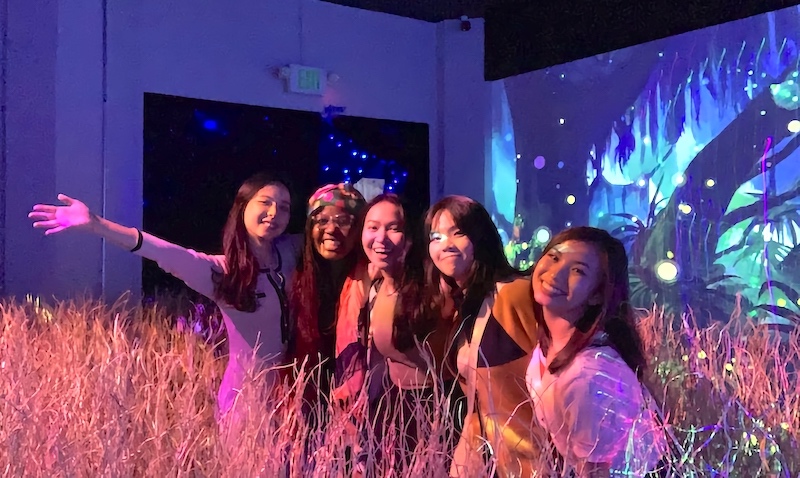
MA1s at the museum
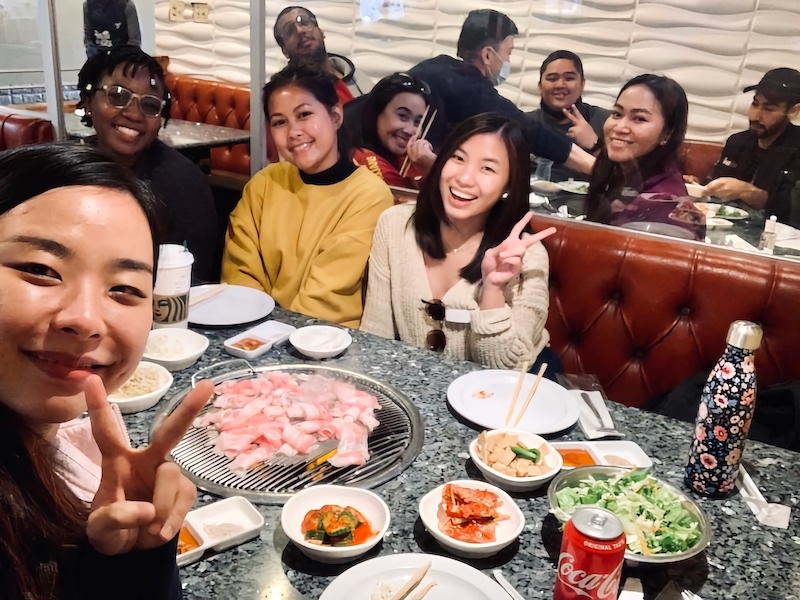
MA1s having Korean BBQ . . . Jisu was not impressed with the food :( LOL 😆
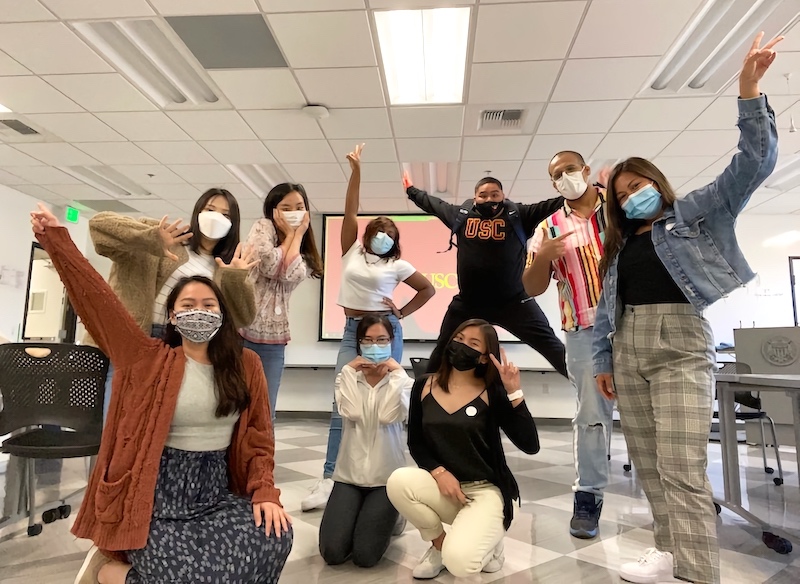
Just happy to have an in-person class!
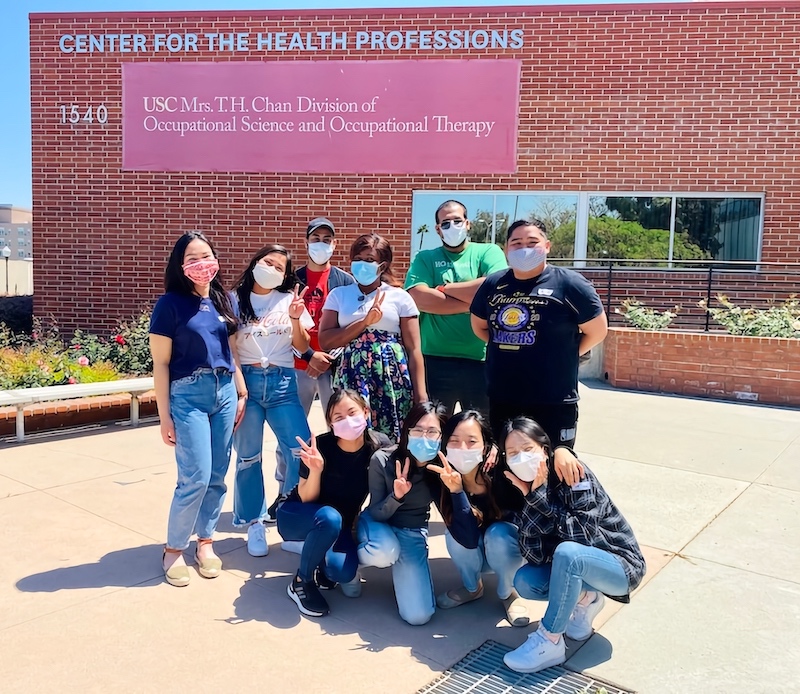
Proudly posing in front of the Chan Division
Of course, my USC Chan experience has been greatly enriched by working with the amazing team of student ambassadors and our supervisor, Kim Kho, who constantly encouraged me to do my best work and really contributed a lot to my growth. I learned A LOT from each and every one of you and I’m so thankful to have been a part of this team!! I also want to thank my dearest family and friends without whom I wouldn’t be where I am today. And to all the readers, it has been a pleasure to be able to share this crazy adventure with you all through my blogs and videos.
Now, I shall go back to studying for my comprehensive exams. After graduation, I will be working with Dr. Daniel Park for the Summer OT Immersion program that is happening on July, so I hope to see some of you there! What’s next after that — I don’t quite know yet; but as always, we Fight On Forever!
All the love and well wishes,
Yna <3
⋯





